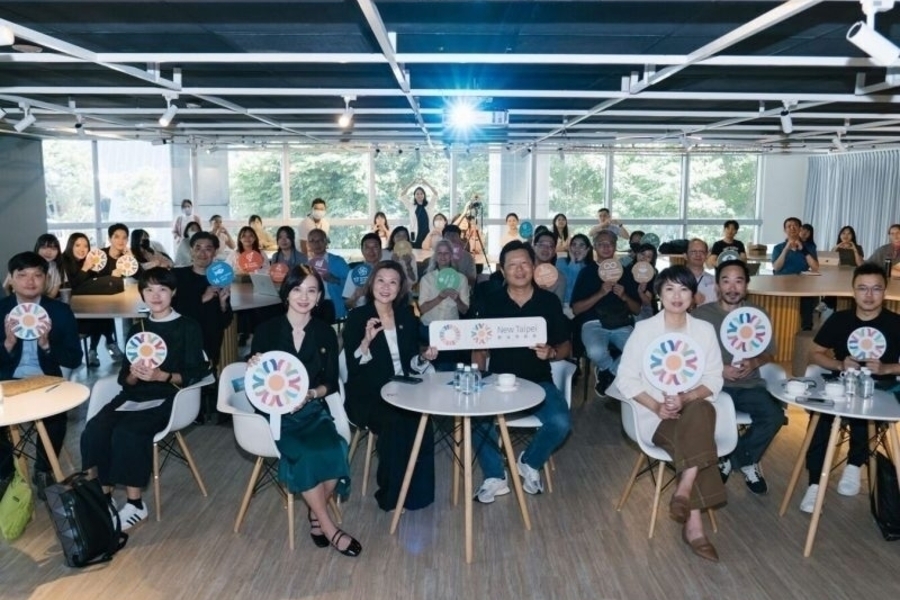“Future Cities: Sustainability Forum” – Redefining the Mission of Design

▲ New Taipei City co-hosts the“Future City: Sustainable Forum”with the Taiwan Design Research Institute and BENCHI Design Consultant
The New Taipei City Government is committed to aligning with international standards in constructing its second administrative center, with a goal to create a modern carbon-neutral building. On October 7th, the city government, in collaboration with the Taiwan Design Research Institute (TDRI) and BENZHI Design Consultant, hosted the “Future Cities: Sustainability Forum” at the Comma Lab. The forum covered topics ranging from sustainable exhibitions, circular economy, and spatial design to comprehensive urban planning, collectively crafting a new chapter for sustainable cities.
In the opening address, New Taipei City Deputy Mayor Chu Ti-Chih highlighted the importance of design in urban governance, noting that 70% of global carbon emissions come from cities, which are crucial to solving these challenges. He expressed hopes that the second administrative center would integrate digital twin models, international standards, and carbon-neutral principles to elevate New Taipei City’s global influence.
The forum highlighted the role of design in driving urban sustainability, attracting 60 experts and scholars from the design, exhibition curation, and academic sectors, along with students from Minerva University and National Taiwan Normal University. Hosted by Wu Yu-Hsuan, director of Industry Foresight Section at the Taiwan Design Research Institute, the forum featured Ling Tsung-Yung, founder of CN Flower Founder, Wang Ting-Shuo, CEO of Yeah Yeah company, Chung Bing-Hung, founder of Archicake Design, Liu Fang-Yu, director of New Taipei City Design Center, Minnie Jan, director of Miso Soup Design, and the Secretariat of New Taipei City Government, all of whom shared their unique insights on how design can contribute to sustainability.
“Farmers as Teachers, Field Collaboration for Sustainable Co-Creation”
Ling Tsung-Yung of CN Flower emphasized the power of collaboration across various sectors. For one event, the team worked with professionals from diverse fields such as metalworking, engineering, and woodworking, but they lacked expertise in farming. Farmers became teachers, sharing their agricultural knowledge, which gained increasing recognition. This collaboration extended to inviting woodworking artists to create a greenhouse theme, contributing to local revitalization. Ling noted, “When an event invites contributions from multiple fields, all knowledge comes together, exceeding expectations, and ultimately, sustainability is realized.”
“Renting Instead of Buying: A New Circular Strategy for Exhibitions”
Wang Ting-Shuo of Yeah Yeah challenged the sustainability of traditional exhibitions, which often create waste. He shared that for their exhibits, they use items already available, such as recyclable stacking boxes. For example, at the New Taipei City Food and Agriculture Education Exhibition, they rented the structures instead of building new ones, and extended the exhibition by bringing the displays into schools for ongoing use. Wang noted, “Many so-called sustainable exhibitions are far from sustainable. Our approach is to reuse and recycle to reduce waste.”
“The Three Major Challenges of Circular Design, Which Require National and Public Policy Efforts”
Chung Bing-Hung of Archicake Design provided a fresh perspective on circular design, highlighting the importance of urban resilience in sustainability. He explained that a city’s ability to recover quickly from disasters—whether natural or a pandemic—is a key indicator of resilience. Chung identified three major challenges of circular design:
- Internal Circular Loopholes: Wastewater discharge from even one household compromises the cleanliness of rivers. Effective wastewater treatment requires resources, and illegal discharges occur under certain circumstances.
- Overlooking External Impacts: Failing to account for the broader environmental impacts.
- Lack of Overall Thinking: In Taiwan, for every green building constructed, ten or more conventional buildings are built, undermining sustainability efforts. Chung emphasized that controlling the overall volume is crucial to achieving sustainability.
“Sustainability Through Transportation: Learning from Copenhagen’s Bicycle System”
Liu Fang-Yu of the New Taipei City Design Center shared a case study from Copenhagen’s bicycle system. Since 2012, Copenhagen has established a comprehensive bicycle infrastructure, now consisting of 16 bike lanes. In contrast to Taiwan, where bicycles are seen as short-distance and recreational tools, bicycles in Copenhagen are used for long-distance commuting. Liu proposed that Taiwan could learn from this model and rethink its transportation system to make it more flexible and sustainable, allowing people to easily move across different urban nodes.
“Inclusive Spatial Design: Strategies for a Sustainable Future”
Minnie Jan of Miso Soup Design demonstrated inclusive spatial design strategies that prioritize accessibility and community engagement. She emphasized the importance of creating spaces that are adaptable and inclusive, promoting social interaction and environmental sustainability. In addition, Jan invited Director-General Yao Ching-Yu of the Secretariat to present awards to National Taiwan Normal University students who participated in design proposals for the second administrative center, encouraging the next generation of designers to engage in sustainable design.
Forum Wrap-Up
In closing, Secretariat Specialist Lee Yueh-Hsien shared the City Hall’s carbon reduction initiatives. The speakers then opened the floor for audience questions and sparked lively discussions. The success of the forum not only highlights New Taipei City’s efforts toward urban sustainability but also reflects widespread support for sustainable cities. With the deepening integration of design thinking in urban governance, New Taipei has taken another step toward a sustainable urban future.
The forum concluded with a lively Q&A session, fostering insightful discussions. All speakers shared their expertise and reflections, demonstrating how design thinking can contribute to sustainable urban development. This successful forum not only showcased New Taipei City’s ongoing efforts but also underscored the collective commitment to building sustainable cities for the future.
For more information about New Taipei City’s initiatives and the Future Cities: Sustainability Forum, visit Here.